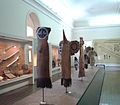Ticuna
The Ticuna , also Tikuna, Tukuna and in their own name Magüta, refers to an indigenous people who live in the region of the Tres Fronteras - in the Brazilian state of Amazonas and in the neighboring area of Peru and Colombia . Their traditional language, the Ticuna, is considered an isolated language .
According to statistical data from Brazil (Instituto Brasileiro de Geografia e Estatística) from 1998, 32,613 Ticuna live in 25 indigenous territories on the upper reaches of the Rio Solimões . One of these territories is Terra Indígena Lago do Beruri in the Beruri municipality . In Peru, the 1993 census recorded only 1,787 ticunas, but only data from 11 of the 18 existing communities were included. In reality, the population is estimated at around 5000–6000 (Goulard, 1994). There are 6,585 ticunas in Colombia (Arango y Sánchez, 1997). They share their residential area with other ethnic groups such as the Bora , Cocama , Huitoto and Yagua .
Ticunas are known for their mask art and ceremonial robes made of feathers.
A series of Ticuna masks ( Museu Nacional da Universidade Federal do Rio de Janeiro )
Feather headdress, Museum of Ethnology (Vienna) .
Feather headdress, Museum of Ethnology (Vienna) .
Mask depicting a monkey ( Museu Nacional da Universidade Federal do Rio de Janeiro )
literature
- Christopher Moseley: Encyclopedia of the World's Endangered Languages . Routledge 2007, ISBN 978-0-70071197-0 , p. 172 ( limited online version on Google Books )
Web links
- Ticuna - Povos Indígenas no Brasil. In: socioambiental.org. Instituto Socioambiental, accessed September 8, 2018 (Brazilian Portuguese).




